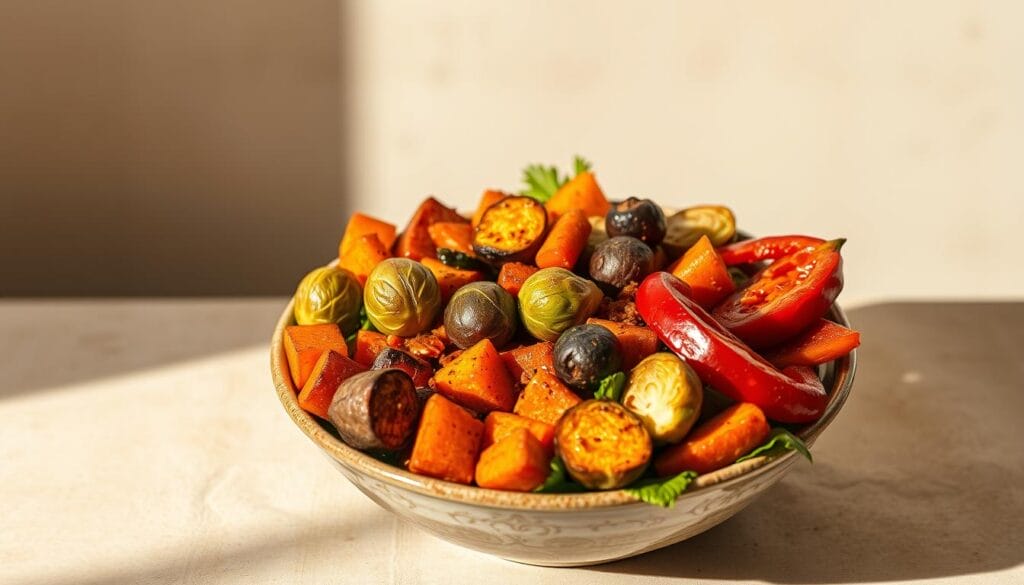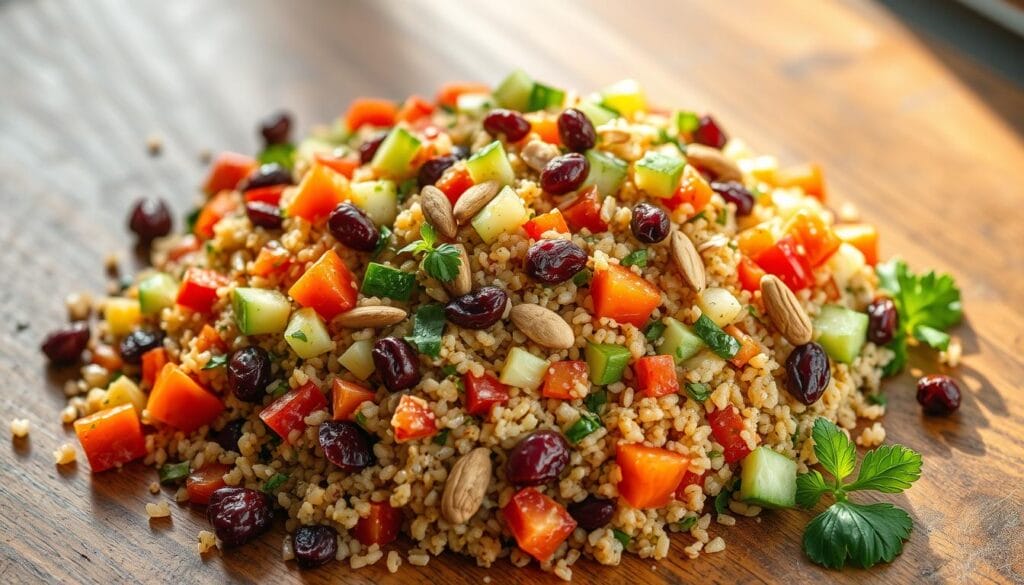The crunch of fresh veggies, the zesty vinaigrette, and Kalamata olives combine perfectly in a Greek salad. Picture it: a sunny afternoon, the golden glow of the sun, longing for the taste of the Mediterranean. A Greek salad connects us to a rich, health-focused Mediterranean diet.
The salad shines with juicy Roma tomatoes, crisp cucumbers, and red onion slices. The feta cheese—golden-brown, cubed, and fried—steals the show. Add rinsed chickpeas and a 1/2 cup of Kalamata olives for the perfect taste.

The dressing mixes lemon juice, red wine vinegar, dried oregano, and extra-virgin olive oil. Preparing this dish takes 20 minutes, serves four easily, and stays fresh for days. The dressing lasts two weeks, ideal for anyone on a busy schedule.
Let’s explore the wonders of a Greek salad, share favorite variations, and give tips for the perfect dish. Perfect for health-conscious folks or anyone craving a yummy meal, this Greek salad will delight your taste buds.
What Makes a Greek Salad Special?
Mediterranean diet is at the heart of the Greek salad, also called Horiatiki. It started in the 1960s in Athens. Feta cheese was added to dodge government price limits.
The salad has six main parts: cucumbers, tomatoes, bell pepper, red onion, olives, and feta cheese. These fresh vegetables make the dish both tasty and healthy.

English cucumbers and vine-ripened tomatoes, big or small, add freshness. Green bell peppers and red onions make it colorful. Kalamata olives provide a unique taste.
Different areas in Greece add their own touch. Crete uses rusk, Tinos uses caper and banana peppers. Paros and Naxos might add watermelon. Parsley is common in Northern Greece. Although Greeks don’t usually add lettuce, other countries do.
The key is the high-quality feta cheese, either crumbled or in blocks. It’s high in protein. With healthy fats from olive oil and lots of fresh vegetables, it’s nutritious. The dressing of olive oil, red wine vinegar, lemon juice, Dijon mustard, garlic, oregano, salt, and pepper makes it zesty.
Greek salad is simple but loved for its fresh ingredients and traditional making. It shows the close relationship between nature and tradition in Greek culture. This makes Greek salad key to healthy eating everywhere.
| Region | Unique Ingredient |
|---|---|
| Crete | Rusk |
| Tinos | Caper and Banana Peppers |
| Paros and Naxos | Watermelon |
| Northern Greece | Parsley |
My Favorite Greek Salad Variations
Greek cuisine lets you play with flavors, especially in Greek salads. You can swap a few ingredients to match various tastes or diets. Here, I’ll share some top picks for those who love tasty, healthy salads.

The classic Horiatiki Salad, known as the Greek Village Salad, is a must-try. It mixes tomatoes, cucumbers, red onion, Kalamata olives, green pepper, feta, olive oil, and Greek oregano. You can have it as a side or the main meal, and it’s a household staple in Greece.
For a green crunch, the Maroulosalata is perfect. It includes romaine lettuce, cucumber, green onions, and a lively dressing. This salad is made of parsley, basil, oregano, garlic, olive oil, lemon juice, and red wine vinegar. It’s an excellent side for any grilled dish.
If you’re looking for something different, try the Cretan Dakos. This light meal or popular buffet choice has barley rusk, tomatoes, red onion, olives, feta, and a tasty vinaigrette.
The Peach, Tomato, and Feta Salad mixes sweet and savory for a fresh twist. With tomatoes, ripe peaches, green onions, mint, feta, and a dressing of olive oil, red wine vinegar, and honey, it’s a hit with grilled meats.
The Grilled Watermelon and Feta Salad shines in the summer. It combines grilled watermelon, feta, olives, oregano, and a zesty dressing. The mix of olive oil, lemon juice, and red wine vinegar makes it perfect for summer gatherings.
Looking for something filling? The Potato Salad with Herbs won’t disappoint. It’s got boiled potatoes, cherry tomatoes, olives, fresh herbs, and a simple vinaigrette. Enjoy it as a light meal or a tasty side dish.
| Salad Name | Main Ingredients | Serving Suggestion |
|---|---|---|
| Horiatiki Salad | Tomatoes, cucumbers, red onion, Kalamata olives, green pepper, feta, olive oil, Greek oregano | Side or main dish |
| Maroulosalata | Romaine lettuce, cucumber, green onions, parsley, basil, oregano, garlic, olive oil, lemon juice, red wine vinegar | Side dish for grilled meats |
| Cretan Dakos | Barley rusk, tomatoes, red onion, olives, feta, vinaigrette | Light meal or buffet item |
| Peach, Tomato, and Feta Salad | Tomatoes, peaches, green onions, mint, feta, olive oil, red wine vinegar, honey | Serve with grilled meats |
| Grilled Watermelon and Feta Salad | Grilled watermelon, feta, olives, oregano, olive oil, lemon juice, red wine vinegar | Summer buffets |
| Potato Salad with Herbs | Boiled potatoes, cherry tomatoes, olives, fresh herbs, vinaigrette | Light meal or side dish |
Try these variations to explore more Mediterranean salad recipes. Whether you love the rich tastes of Greek food or want refreshing, healthy salads, these veggie dishes promise freshness and flavor in every meal.
Tips for Preparing the Perfect Greek Salad
To make an amazing Greek salad, start by picking fresh ingredients. Look for ripe tomatoes like heirloom or cherry varieties. Choose tomatoes that are heavy and slightly soft. English cucumbers are great because you don’t need to peel them. For that real taste, get feta cheese that’s made in Greece or from sheep’s milk, often in brine.
Kalamata olives are perfect with their unique taste. Make sure they’re firm and in clear brine. Add thinly sliced red onions for a sharp flavor and a dash of color. Use green bell peppers for a traditional touch or mix colors for fun.
For the dressing, combine olive oil, red wine vinegar, lemon juice, garlic, and herbs like oregano. Mix well to get a smooth dressing. Assemble the salad right before eating to keep veggies crisp. Letting the salad sit for a bit before serving blends the flavors nicely.
FAQ
What are the traditional ingredients in a Greek salad?
A Greek salad, or Horiatiki, really stands out with its ingredients. You’ll find ripe tomatoes, crisp cucumbers, and tangy red onions. It’s mixed with Kalamata olives and feta cheese. A dressing made from extra virgin olive oil, red wine vinegar, and oregano tops it off.
How can I make my Greek salad more filling?
To make your Greek salad heartier, consider adding grilled chicken or shrimp. Quinoa is another great choice. For a vegan option, chickpeas or a plant-based cheese can be added.
Why doesn’t traditional Greek salad include lettuce?
Traditional Greek salad doesn’t have lettuce to focus on the freshness of tomatoes, cucumbers, and feta. In the U.S., some versions add romaine lettuce for a crunchy texture.
Can I make a Greek salad vegan?
Yes, making a vegan Greek salad is easy. Swap out the feta for a vegan cheese. Also, check that the dressing and other ingredients are vegan.
What fresh veggies can I add to a Greek salad?
You can add more veggies to your Greek salad for extra crunch and taste. Consider bell peppers, radishes, or carrots. Don’t forget herbs like dill, parsley, or mint to boost the flavor.
What are the health benefits of a Greek salad?
Greek salad offers many health benefits. It’s packed with nutrients and antioxidants from the fresh veggies. The olive oil and olives provide heart-healthy fats. Plus, feta cheese delivers calcium and protein. It’s a nutritious choice.
How should I prepare the dressing for my Greek salad?
Creating the dressing for a Greek salad is simple yet delicious. Mix extra virgin olive oil with red wine vinegar. Flavor it with dried oregano, salt, pepper, and a splash of lemon juice for zest.
When is the best time to assemble a Greek salad?
Assemble your Greek salad right before you plan to serve it. This keeps the veggies fresh and crunchy. Allowing it to sit for a bit before serving blends the flavors perfectly.



